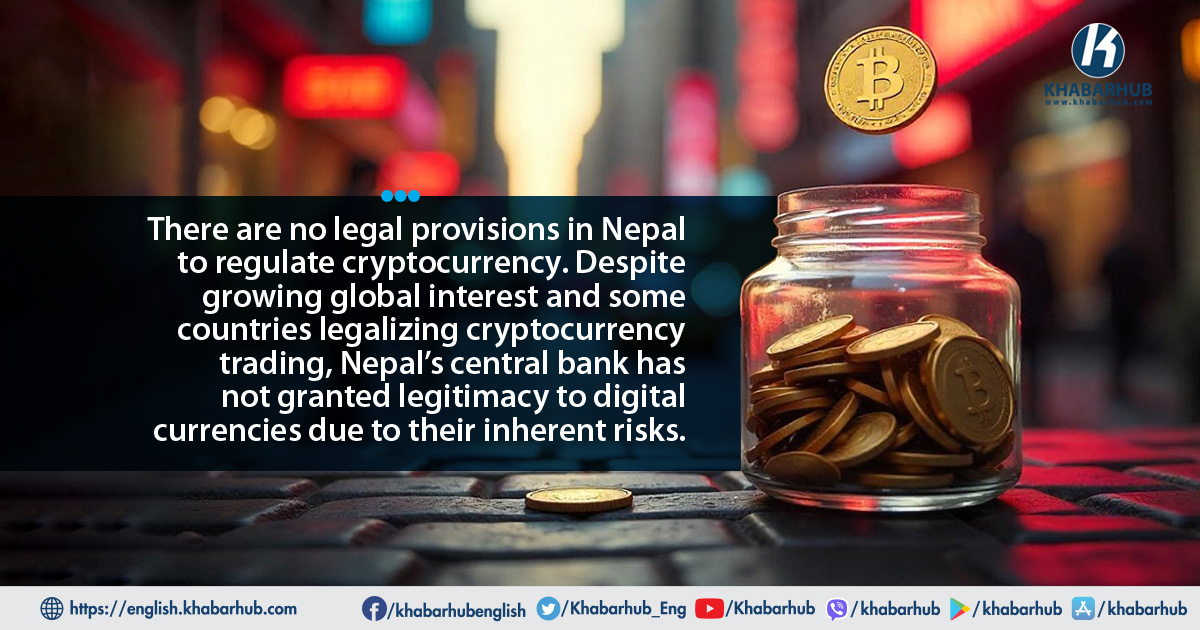KATHMANDU: With the election of Donald Trump as U.S. President, the price of the intangible currency Bitcoin reached $100,000 per unit for the first time.
Recent data shows that prices of other cryptocurrencies have also been rising.
With Trump’s return to the political scene and the surge in cryptocurrency prices, discussions about the subject have intensified.
After Bitcoin’s price increase, it was reported that Bhutan sold Bitcoin worth nearly 6 billion Nepali rupees.
Countries around the world are divided on how to view and regulate cryptocurrency.
According to the latest news from Investopedia, cryptocurrency transactions have been legalized in countries including the U.S., U.K., Canada, France, Australia, Denmark, Germany, Japan, Switzerland, Spain, the Bahamas, and Austria.
However, cryptocurrency transactions are banned in many countries, including China, Pakistan, Saudi Arabia, Tunisia, and Bolivia. The same holds true in Nepal. Cryptocurrency mining and trading are not allowed here.
According to a report by RMI, Bitcoin mining alone consumes 127 terawatt-hours of electricity annually, which is equivalent to the total electricity consumption of countries such as Norway.
Nepal Rastra Bank has issued multiple notices over the years stating that the mining and trading of any form of cryptocurrency are illegal.
What is Cryptocurrency? How risky is it?
Cryptocurrency is a type of digital or virtual currency that is not backed by a physical entity. It is created through processes such as mining and staking.
Cryptocurrencies can only be traded online, and unlike traditional currencies, there is no regulatory body overseeing them.
Unlike physical currencies, cryptocurrencies are considered risky for several reasons: their value is volatile, they are susceptible to hacking and theft, and they are not recognized or regulated by many governments.
There are no legal provisions in Nepal to regulate cryptocurrency. Despite growing global interest and some countries legalizing cryptocurrency trading, Nepal’s central bank has not granted legitimacy to digital currencies due to their inherent risks.
Dilliram Pokhrel, Joint Spokesperson of Nepal Rastra Bank, explains: “Cryptocurrencies are volatile, making them a risky asset for business. Many countries, including Nepal, have banned them for several reasons.”
Pokhrel emphasizes that the value of physical currencies, issued by central banks, is generally stable, whereas cryptocurrencies experience drastic fluctuations, leading to potential losses for traders.
Central banks are responsible for issuing and guaranteeing the value of their currencies.
This guarantee allows individuals, organizations, and countries to exchange or use the currency as needed.
However, cryptocurrencies do not have such a guarantee system, making them difficult to regulate or legalize, Pokhrel adds.
“Our currency is backed by the Government of Nepal. But with cryptocurrencies, there is no system to determine who issued them or who will act as the guarantor. The Nepal Rastra Bank cannot regulate them due to the risks involved,” says Pokhrel.
While the value of currencies generally fluctuates, cryptocurrencies have experienced extreme volatility. Due to this, they are often regarded as “speculative assets” rather than stable investments.
Despite the high electricity demand from cryptocurrency mining, there are many other sectors in Nepal that could consume electricity.
Pokhrel further notes, “For crypto to be regulated, a separate regulatory framework would be required, but we currently lack the necessary technology and infrastructure.”
Potential for high electricity consumption
Cryptocurrency production, particularly Bitcoin mining, is known to consume massive amounts of electricity.
According to a report by RMI, Bitcoin mining alone consumes 127 terawatt-hours of electricity annually, which is equivalent to the total electricity consumption of countries such as Norway.
In Nepal, the Independent Power Producers Association (IPPAN) reports that there is potential to generate up to 72,544 megawatts of electricity from the country’s rivers and streams.
While some hydropower projects are under development, Nepal currently generates around 3,000 megawatts of electricity.
Both the government and private sector are concerned about how to manage and sell this electricity in the future.
To address this, Nepal has signed energy trade agreements with India and Bangladesh, both of which have begun importing electricity from Nepal.
Despite the high electricity demand from cryptocurrency mining, there are many other sectors in Nepal that could consume electricity.
However, Pokhrel, the deputy spokesperson of Nepal Rastra Bank, points out that the energy sector should not prioritize cryptocurrency mining due to the associated risks.
“While Nepal has strong foreign exchange reserves, adopting a liberal policy toward a risky sector like cryptocurrency could have significant repercussions on these reserves,” Pokhrel warns.









Comment